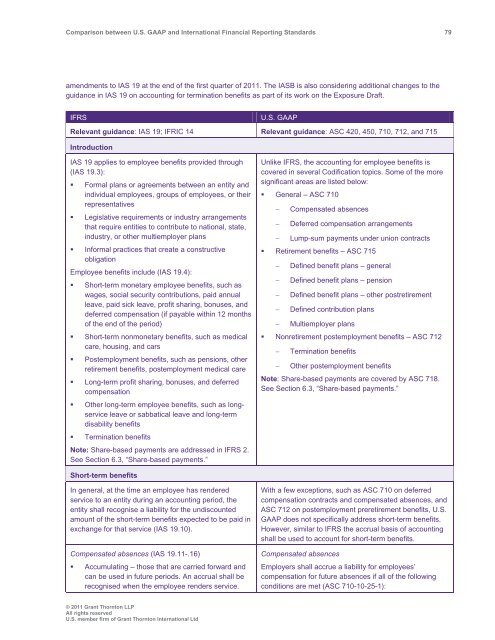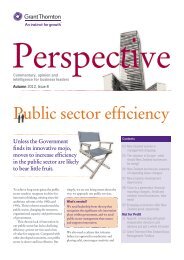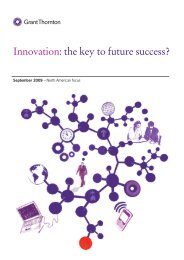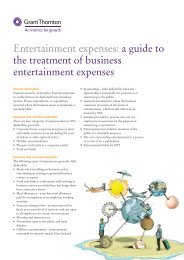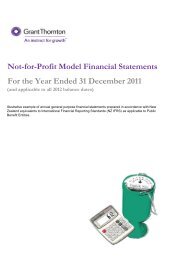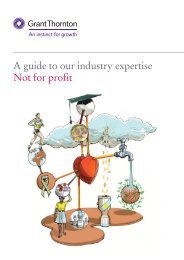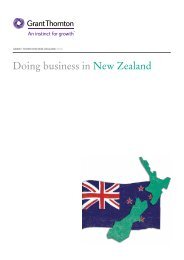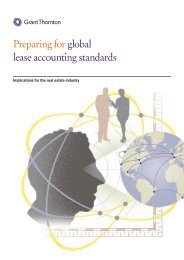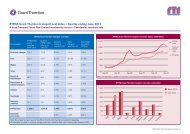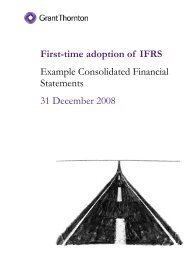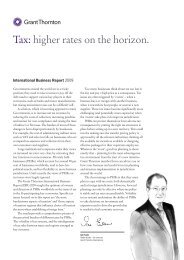Comparison between U.S. GAAP and International ... - Grant Thornton
Comparison between U.S. GAAP and International ... - Grant Thornton
Comparison between U.S. GAAP and International ... - Grant Thornton
Create successful ePaper yourself
Turn your PDF publications into a flip-book with our unique Google optimized e-Paper software.
<strong>Comparison</strong> <strong>between</strong> U.S. <strong>GAAP</strong> <strong>and</strong> <strong>International</strong> Financial Reporting St<strong>and</strong>ards 79<br />
amendments to IAS 19 at the end of the first quarter of 2011. The IASB is also considering additional changes to the<br />
guidance in IAS 19 on accounting for termination benefits as part of its work on the Exposure Draft.<br />
IFRS<br />
U.S. <strong>GAAP</strong><br />
Relevant guidance: IAS 19; IFRIC 14 Relevant guidance: ASC 420, 450, 710, 712, <strong>and</strong> 715<br />
Introduction<br />
IAS 19 applies to employee benefits provided through<br />
(IAS 19.3):<br />
• Formal plans or agreements <strong>between</strong> an entity <strong>and</strong><br />
individual employees, groups of employees, or their<br />
representatives<br />
• Legislative requirements or industry arrangements<br />
that require entities to contribute to national, state,<br />
industry, or other multiemployer plans<br />
• Informal practices that create a constructive<br />
obligation<br />
Employee benefits include (IAS 19.4):<br />
• Short-term monetary employee benefits, such as<br />
wages, social security contributions, paid annual<br />
leave, paid sick leave, profit sharing, bonuses, <strong>and</strong><br />
deferred compensation (if payable within 12 months<br />
of the end of the period)<br />
• Short-term nonmonetary benefits, such as medical<br />
care, housing, <strong>and</strong> cars<br />
• Postemployment benefits, such as pensions, other<br />
retirement benefits, postemployment medical care<br />
• Long-term profit sharing, bonuses, <strong>and</strong> deferred<br />
compensation<br />
• Other long-term employee benefits, such as longservice<br />
leave or sabbatical leave <strong>and</strong> long-term<br />
disability benefits<br />
• Termination benefits<br />
Note: Share-based payments are addressed in IFRS 2.<br />
See Section 6.3, “Share-based payments.”<br />
Unlike IFRS, the accounting for employee benefits is<br />
covered in several Codification topics. Some of the more<br />
significant areas are listed below:<br />
• General – ASC 710<br />
<br />
<br />
Compensated absences<br />
Deferred compensation arrangements<br />
Lump-sum payments under union contracts<br />
• Retirement benefits – ASC 715<br />
<br />
<br />
<br />
<br />
Defined benefit plans – general<br />
Defined benefit plans – pension<br />
Defined benefit plans – other postretirement<br />
Defined contribution plans<br />
Multiemployer plans<br />
• Nonretirement postemployment benefits – ASC 712<br />
<br />
Termination benefits<br />
Other postemployment benefits<br />
Note: Share-based payments are covered by ASC 718.<br />
See Section 6.3, “Share-based payments.”<br />
Short-term benefits<br />
In general, at the time an employee has rendered<br />
service to an entity during an accounting period, the<br />
entity shall recognise a liability for the undiscounted<br />
amount of the short-term benefits expected to be paid in<br />
exchange for that service (IAS 19.10).<br />
Compensated absences (IAS 19.11-.16)<br />
• Accumulating – those that are carried forward <strong>and</strong><br />
can be used in future periods. An accrual shall be<br />
recognised when the employee renders service.<br />
With a few exceptions, such as ASC 710 on deferred<br />
compensation contracts <strong>and</strong> compensated absences, <strong>and</strong><br />
ASC 712 on postemployment preretirement benefits, U.S.<br />
<strong>GAAP</strong> does not specifically address short-term benefits.<br />
However, similar to IFRS the accrual basis of accounting<br />
shall be used to account for short-term benefits.<br />
Compensated absences<br />
Employers shall accrue a liability for employees’<br />
compensation for future absences if all of the following<br />
conditions are met (ASC 710-10-25-1):<br />
© 2011 <strong>Grant</strong> <strong>Thornton</strong> LLP<br />
All rights reserved<br />
U.S. member firm of <strong>Grant</strong> <strong>Thornton</strong> <strong>International</strong> Ltd


